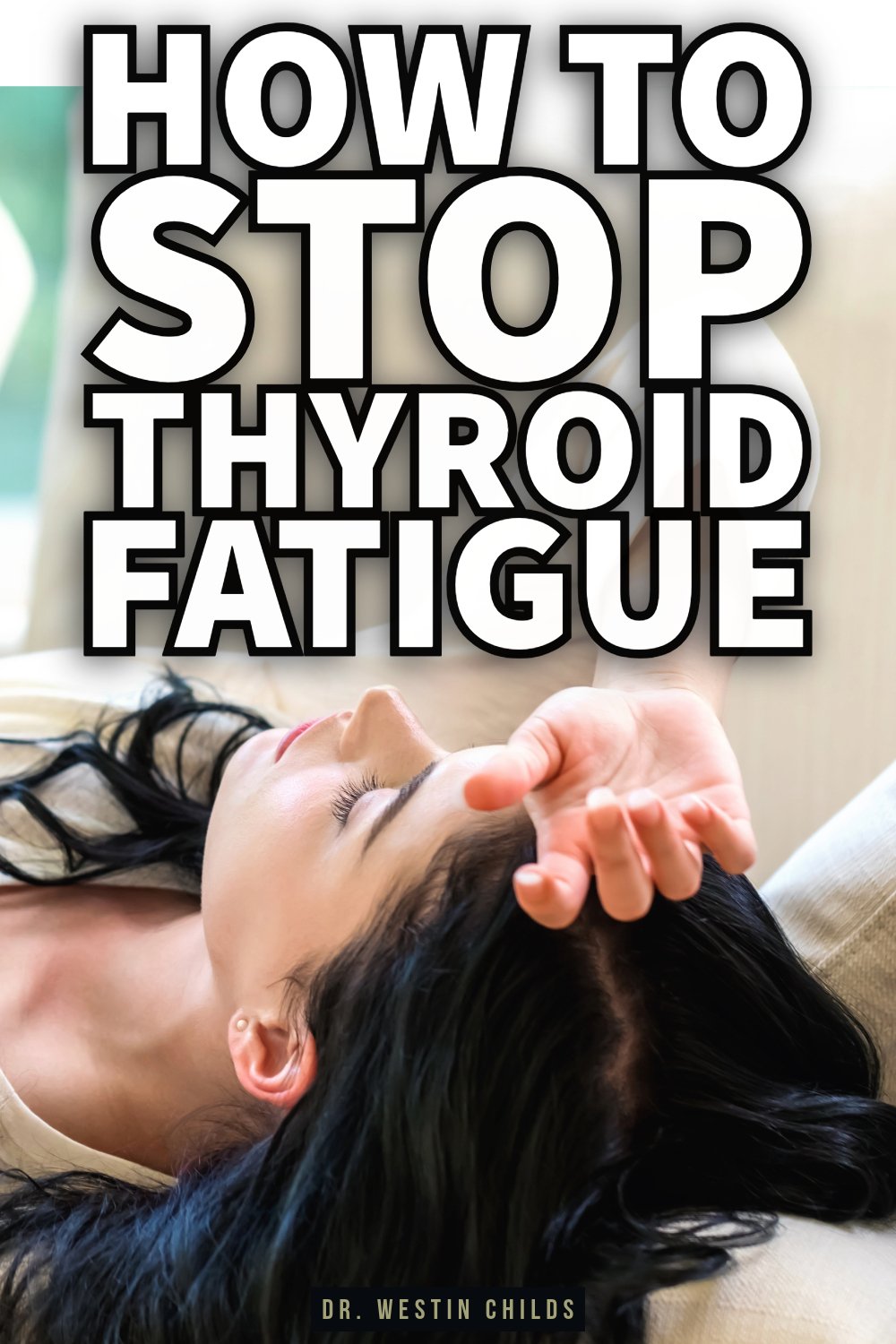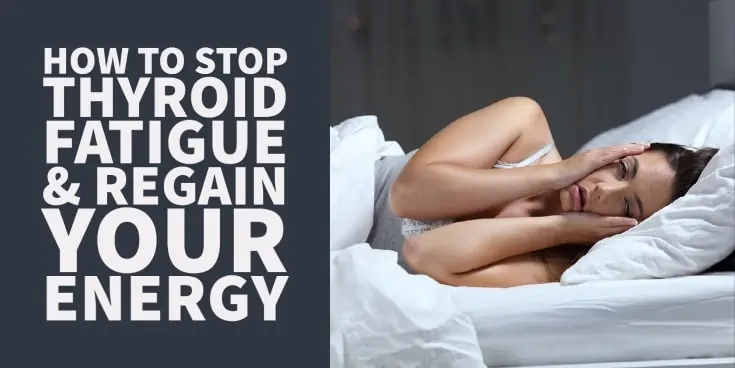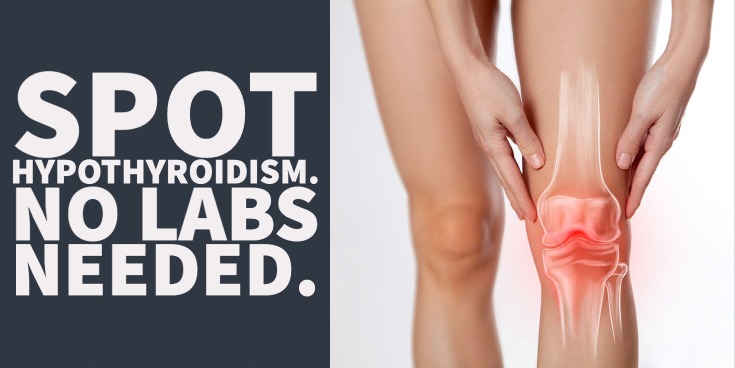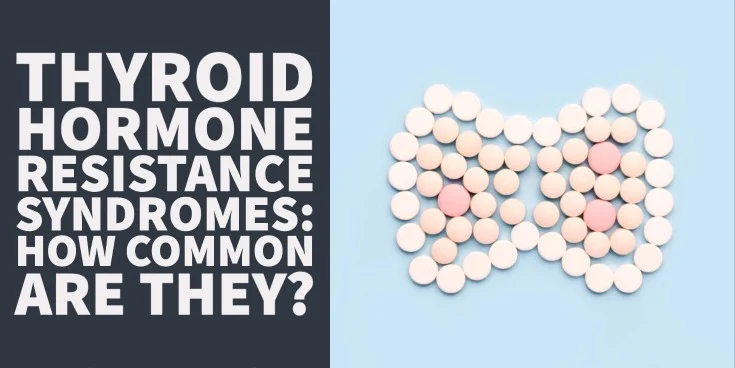Fatigue is one of the most common (and frequently reported) symptoms of hypothyroidism.
Fatigue is the result of various changes in your body including nutrient imbalances, poor mitochondrial function, and even tissue-level hypothyroidism.
What’s more interesting is that in order to treat and reverse thyroid fatigue you actually need more than just thyroid medication.
Why?
Because the subjective symptom of fatigue can come from multiple different places in the body.
Thyroid Patients and Energy Levels
Why do thyroid patients get fatigued?
Fatigue is a subjective symptom and is synonymous with “energy levels”.
Thyroid patients are very prone to developing fatigue and low energy for several reasons:
- Thyroid hormone causes nutrient deficiencies in certain vitamins like B12 (1) which reduce energy production in the body.
- Most cases of hypothyroidism are caused by autoimmune conditions which may result in inflammation (2) and inflammatory states can “wear you down” (imagine when you are sick with the cold, what is your energy like?).
- Thyroid hormone directly influences your metabolism through mitochondrial function (3).
- Hypothyroidism results in various hormonal changes that can worsen fatigue (4).
What’s even more interesting is that simply replacing thyroid hormone in the body may not be enough (and frequently it isn’t) to increase your energy levels.
Why?
Well if you are Vitamin B12 deficient as a result of low thyroid hormone, then simply taking thyroid hormone isn’t necessarily going to magically increase your B12 levels.
This same logic holds true for a number of conditions that we will talk about.
But first, some further questions:
If fatigue is a symptom of hypothyroidism shouldn’t it go away when you take thyroid hormone?
Does having fatigue even after taking thyroid medication with a “normal” TSH mean that your thyroid is “fine”?
These are interesting questions and worth exploring further.
If you look at patients who have had their thyroid removed studies show that these patients have persistent fatigue for YEARS after their surgery when compared to age-matched controls (5).
What does this mean?
Well, it can mean a couple of different things…
#1 – Taking your thyroid out causes fatigue in some way that is unrelated to your thyroid hormone.
Or.
#2. Maybe we don’t quite understand thyroid function and physiology or we are under-treating our thyroid patients.
In reality, it’s probably a combination of both and I will expand on that theory below.
With these factors in mind let’s talk about the many different ways that your thyroid can cause fatigue, but more importantly what to do about it:
#1. Support your Adrenals and Cortisol Level
No matter how you look at it your thyroid hormone is involved with the production of cortisol (in more ways than one).
Studies have shown that TSH tends to track with cortisol levels (6).
As your TSH increases your cortisol tends to increase as well.
In this setting, a high TSH is used as a marker for diagnosing hypothyroidism, so when you don’t have enough thyroid hormone in your body you may develop HIGH cortisol levels.
What you may not realize is that small changes to your cortisol levels can result in big changes in terms of symptoms.
Anything that causes an increase or change to your normal cortisol regulatory pathways may result in fatigue (7) and even a decrease in cognitive ability (8).
Even if you didn’t have these studies you probably intuitively know that your thyroid may be influencing your HPA axis.
Why?
Because you probably have other classic symptoms of HPA dysregulation:
- Fatigue especially upon awakening in the morning
- Increase in energy or “second wind” at night right before sleep
- Difficulty with sleep or insomnia
- Inability to tolerate stressful situations
- Weight gain or inability to lose weight
- Increased cravings for certain foods including carbohydrates and refined sugars
- Reliance upon caffeine and other stimulants for “pick me ups”
Most thyroid patients have experienced some degree of these symptoms listed above.
And the problem may be related to cortisol and your HPA axis.
But what can you do about it?
We will talk more about other factors that influence your cortisol but for starters, you should learn about cortisol and what supplements you can take to manage these cortisol levels.
There are two categories of supplements that support your adrenal-thyroid connection which can help you obtain more energy:
#1. Adrenal (with or without thyroid) glandulars.
These supplements contain animal endocrine glands (either of the thyroid or the adrenals) which have been desiccated into powder form for humans to take as a supplement.
Many thyroid patients have great success using glandulars because they contain proteins, enzymes, and pro-hormones found inside of the thyroid gland of animals which, supposedly, can be used by the human body.
The belief is that your thyroid gland uses these ingredients which reduces the stress and pressure placed upon it which then allows for better thyroid function.
It’s not 100% known how or why these ingredients work but there are a lot of thyroid patients who have used them with success in the past.
You can get adrenal glandulars here and a combination of thyroid with adrenal glandulars here.
And #2. Adrenal adaptogens.
If the thought of taking animal hormone glands isn’t appealing, then you also have the option to use plant-based botanical ingredients with adrenal adaptogens.
Adrenal adaptogens are plant-derived ingredients that help your body tolerate stress by increasing your resilience.
They also seem to have some impact on cortisol levels as well, though this effect is not well understood.
There are many types of adaptogens available but I find blends of various types of adaptogens to be most effective for thyroid patients.
You can see an example of what I am talking about here.
#2. Make sure your Iron & Ferritin are in the “Sweet Spot”
Another very important nutrient that is absolutely required for proper energy production is iron.
When I’m talking about iron I am referring to iron deficiency and NOT anemia.
Most physicians consider iron to be a problem when you develop a condition known as anemia, which is to say your number of red blood cells in the bloodstream has dropped to a point where they are causing symptoms in your body.
But to suggest that iron deficiency is only a problem when it causes anemia is not a good idea.
Why?
Because studies have shown that low iron by itself (even if you have normal red blood cells) has been shown to cause anemia.
What’s more interesting is that iron supplementation in nonanemic menstruating women has been shown to INCREASE energy levels and reduce fatigue (9).
How many women run around with low iron levels but normal hemoglobin levels but who are never treated with iron?
I’ve seen a fair amount of these patients.

Another important aspect to consider is the fact that iron is required for proper thyroid hormone production (10).
Thyroid hormone is also involved in iron absorption, so hypothyroidism increases your risk of developing iron deficiency.
So now we have a scenario where thyroid patients are at increased risk for developing low iron, they are at increased risk for not absorbing it, the iron itself lowers thyroid function AND most providers only treat anemia.
It’s easy to see why hypothyroid patients should have their iron levels checked AND treated if it is determined to be low (regardless of what your hemoglobin is).
You can read more about iron deficiency and thyroid function here.
What if your iron level is low?
You can of course supplement in a way that won’t cause constipation and may increase your energy levels:
How to Supplement with Iron
- Liquid iron: Start with 10 ml each day, do not exceed 20 ml per day (if you take more than 1 dose per day make sure to split it apart from one another and take at least 4 hours away from your thyroid medication)
- Iron capsules: Start with 1 capsule of iron and increase up to 3 per day as tolerated and based on your serum iron/ferritin levels (take at least 4 hours away from your thyroid medication)
- *Note: only supplement with iron if you have a documented deficiency! Taking iron when you don’t need it can cause iron overload syndromes and is not recommended.
#3. Consider B12 Shots over Oral & Sublingual B12 Supplements
Up to 40% of hypothyroid patients also have suboptimal levels of B12 (11) or are considered vitamin B12 deficient.
This is a huge deal because vitamin B12 is involved in the production of energy due to its effects on your mitochondria.
Low levels of vitamin B12 result in a reduction in mitochondrial energy production (due to reduced efficiency) which manifests as fatigue.
B12 is also well known to provide “boosts” of energy in those who consume it.
One of the main products of energy drinks and other energy supplements is B12.
Why?
Because so many patients have suboptimal B12 levels.
This brings us to our next point:
So why B12 shots versus oral or sublingual B12?
In my experience, I’ve found a huge difference in terms of how vitamin B12 shots improve fatigue in thyroid patients.
I have many patients who have been on oral and even sublingual forms of B12 who don’t respond, only to respond with increased energy once they switch to shots.
Shots are superior to oral forms because they get directly into the tissues and bypass gastrointestinal absorption.
Many thyroid patients have issues with constipation, SIBO, and other GI-related issues that can impair the absorption of nutrients (and even other hormones).
So whenever possible it’s best to bypass the GI tract to ensure as much absorption of nutrients as possible.
Vitamin B12 shots can be a quick and effective way to consistently manage energy levels in hypothyroid patients.
#4. Get on the Right Type and Dose of Thyroid Medication
The truth is that being on the right type and dose of thyroid hormone is also necessary for proper energy levels.
While it is not necessarily the ONLY or even the most important factor for increasing your energy levels it is still worth discussing.
Currently, the thyroid treatment paradigm is focused on treating your thyroid based on your TSH.
Most providers and physicians feel that this allows a steady stream of thyroid hormone into your cells and technically makes you euthyroid.
This is interesting because most patients still have symptoms of hypothyroidism despite having “normal” lab work.
In addition, several studies have shown that patients who are treated with “normal” TSH levels still show around 20% less circulating T3 and T4 thyroid hormones in their blood compared to age-matched controls (12).
When you read this it’s important to consider that your T3 and T4 levels are far more important than your TSH in determining the cellular function of the thyroid.
This would suggest that TSH is not the best marker for evaluating your thyroid levels in the body and indeed I have written about several conditions where the TSH isn’t very accurate.
When it comes to thyroid hormone in the body most patients do require more thyroid hormone than they are currently being treated with.
It turns out that a more sensitive marker for assessing cellular levels of thyroid hormone is your reverse T3:free T3 ratio.
This ratio gives you an idea of how much thyroid hormone (specifically T3 thyroid hormone) is entering your cells and turning on genetic function.
In order to feel optimal most patients will need some combination of T4 plus T3 thyroid hormone.
This can be taken in various forms including Synthroid plus Cytomel or medications such as Natural Desiccated Thyroid hormones like WP thyroid or Armour thyroid.
Not all patients will need T3 thyroid hormone, in fact sometimes simply switching from levothyroxine to Tirosint is enough to boost thyroid hormone sufficiently.
In addition, taking your thyroid hormone at night may actually increase your thyroid hormone levels in the serum due to changes in hormones and absorption.
#5. Avoid Stimulants & Caffeine
This one may sound counter-intuitive so let me explain:
Stimulants and caffeine work by increasing the demand for existing hormonal systems in your body.
Caffeine helps produce energy by putting pressure on your adrenal glands to produce more cortisol and increase adrenaline production.
But what if you are putting pressure on a system that is already weak, to begin with?
This is exactly what happens when thyroid patients take stimulants.
And by the way, stimulants can include medications like Adderall and other ADD/ADHD medications.
While caffeine may provide you with a “quick” boost to help you get through the day, it may be causing more harm than good in the long term.
If you find yourself reliant upon caffeine (one of the systems of adrenal-related issues and adrenal fatigue), then it’s a good sign that you should NOT be consuming it.
As you wean yourself off of stimulants you will find your energy naturally increases and your sleep schedule naturally improves.
#6. Get 8 Hours of HIGH-Quality sleep each night
Another obvious, but often ignored, cause of low energy in thyroid patients is a lack of sleep.
Why?
Well, it could have something to do with the fact that thyroid hormone is involved in both REM and non-REM sleep (13).
This means that low (or high) thyroid hormone may directly reduce the QUALITY of your sleep.
This may explain why some patients can still have fatigue despite sleeping 10+ hours per night.
It doesn’t matter how long you sleep if the quality of that sleep is poor.
So make sure that you focus on quantity but also quality.
If hypothyroidism is causing a reduction in your quality then you will need thyroid hormone replacement to fix this problem.
If you simply don’t sleep well as a result of high stress, anxiety, or reliance upon caffeine then you really need to step it up and focus on getting more sleep.
Another important factor is to consider WHEN you are getting your sleep.
People tend to have better functioning circadian rhythms when they sleep through the EVENING, and not through the daytime.
This is outlined perfectly in studies that show people who work nights (in this case nurses) have an increased risk of DEATH from all causes and an increased risk of heart attacks (14).
Moral of the story?
Time to get 8 hours of sleep per night.
If you need help with supplementation then see the list below:
#7. Eat more Healthy Fat (minimize and eliminate sugar & refined carbohydrates)
Changing your diet is another important aspect of increasing your energy and reducing your fatigue.
One common theme you will find among thyroid patients is that they run to sugar or carbs as a source of energy.
Why?
Sugar, much like caffeine, may provide a quick “boost” to your energy due to its rapid absorption and metabolism but, much like caffeine, it will do more harm than good in the long run.
If you think of energy drinks, what do they consist of?
Loads of sugar and loads of caffeine.
Constant and frequent snacking and eating of sugar/carbs will result in higher levels of insulin resulting in long-term weight gain and/or difficulty losing weight.
Instead of focusing on sugar as a source of energy, it’s better to focus on healthy fats.
Healthy fats (listed below) provide long-term and sustained energy throughout the day and will not give you the highs/lows that sugar does.
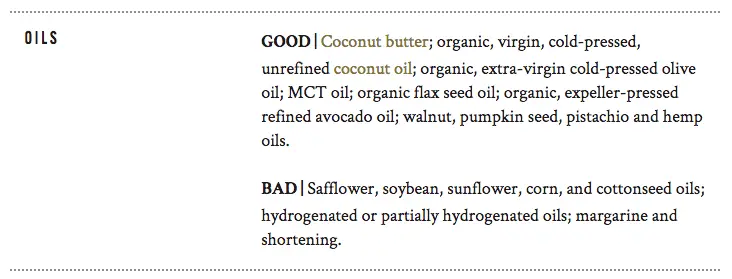
Make sure to incorporate healthy fats into your diet, but do realize that it may take up to 3-4 weeks before your body is fully able to metabolize and oxidize fats for energy.
During this process, you may notice increased irritability and/or a reduction in energy (this is normal).
Healthy fats to help increase your energy:
- Coconut butter/oil
- Cold-pressed/organic oils such as olive oil
- MCT oil
- Organic flax seed
- Avocado oil
Avoid industrial seed oils which can promote inflammation and lead to weight gain (see a list of other foods to avoid here):
- Safflower oil
- Soybean oil
- Sunflower oil
- Corn oil
- Cottonseed oil
- Hydrogenated or partially hydrogenated oils
#8. Reduce & Manage your Stress with these Techniques
Hopefully, I don’t need to convince you that stress will lead to fatigue and a host of other problems like weight gain (15) and autoimmunity (16).
Instead, let me give you some tips to help manage your stress.
One of the easiest ways is to help relax your mind by listening to audio clips.
Listening to these clips can help promote delta wave activity in your brain which may help improve your sleep and help you manage your stress.
You can start with these clips:
Find this site on your iPhone/smartphone, throw in some earphones, and let these audio clips run while you lay in bed.
Do this every night and you will find benefits over a few weeks.
These were the techniques that I used to help during residency.
#9. Take A Comprehensive B Complex Vitamin
While vitamin B12 is important for mitochondrial energy production, it’s certainly not the only B vitamin involved in this process.
Vitamins B2, B3, B5, and B12 are all required:

In addition, Vitamin B6 supplementation has been shown to improve energy and mood.
Vitamin B deficiencies are also very common, especially among hypothyroid patients.
Supplementing with a B complex in addition to vitamin B12 shots can dramatically improve energy levels.
Make sure to find a B complex with high levels of B6 like this one.
Wrapping It Up
Fatigue is a very common symptom of hypothyroidism and may indicate a deeper problem ranging from hormone imbalances to nutrient deficiencies.
Simply replacing thyroid hormone may not be enough to completely energize your body and reduce your fatigue.
Instead make sure to take a comprehensive approach which includes evaluation for nutrient deficiencies and treatment of other aspects of your life such as diet, stress, and sleeping patterns.
The combination of these therapies above has proven to be very effective in my patients and I think you will also find these techniques helpful.
Make sure to employ ALL of the therapies that are relevant to you.
Now it’s your turn:
Are you suffering from thyroid fatigue?
What have you tried?
What’s worked and what hasn’t?
Leave your comments below!
Scientific References
#1. https://www.ncbi.nlm.nih.gov/pubmed/18655403
#2. https://www.ncbi.nlm.nih.gov/pmc/articles/PMC3271310/
#3. https://www.ncbi.nlm.nih.gov/pubmed/12552316
#4. https://www.ncbi.nlm.nih.gov/pmc/articles/PMC3520819/
#5. https://www.ncbi.nlm.nih.gov/pmc/articles/PMC3783928/
#6. https://www.ncbi.nlm.nih.gov/pmc/articles/PMC3520819/
#7. https://www.ncbi.nlm.nih.gov/pubmed/18840940
#8. https://www.ncbi.nlm.nih.gov/pubmed/23743260
#9. https://www.ncbi.nlm.nih.gov/pubmed/22777991
#10. https://www.ncbi.nlm.nih.gov/pubmed/2498473
#11. https://www.ncbi.nlm.nih.gov/pubmed/18655403
#12. https://www.ncbi.nlm.nih.gov/pubmed/27700539
#13. https://www.ncbi.nlm.nih.gov/pubmed/10526632
#14. https://www.ncbi.nlm.nih.gov/pubmed/25576495
#15. https://www.ncbi.nlm.nih.gov/pubmed/23512679
#16. https://www.ncbi.nlm.nih.gov/pubmed/21094920
